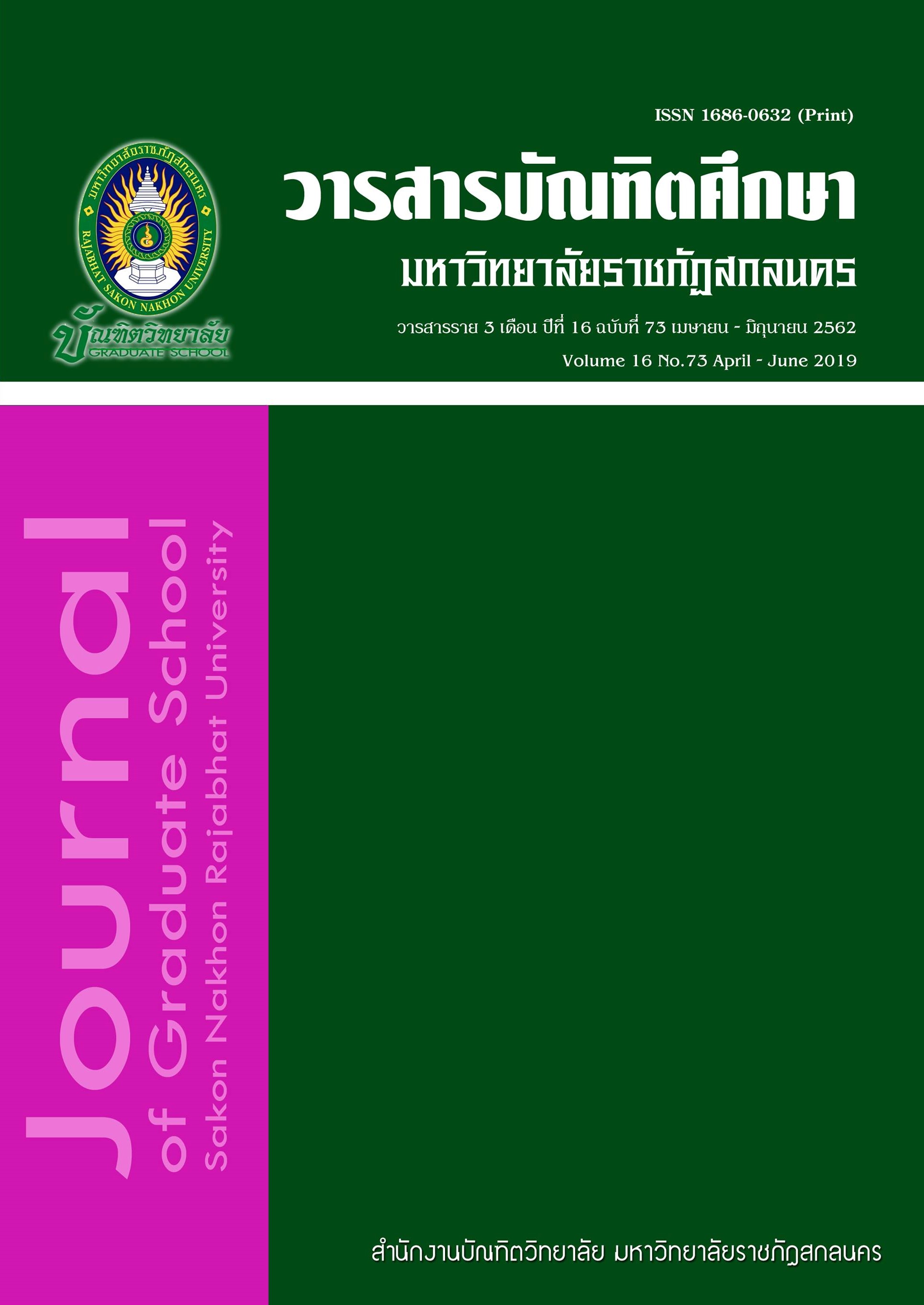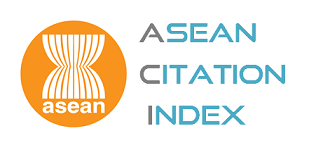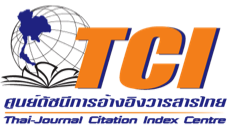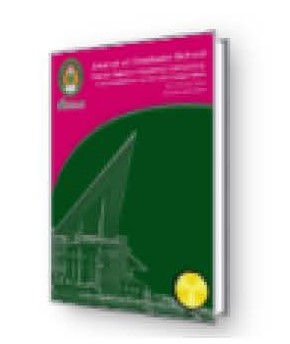แนวทางส่งเสริมการพัฒนาสมรรถนะทางวิชาชีพบรรณารักษ์ที่พึงประสงค์ในยุคดิจิทัล มหาวิทยาลัยเทคโนโลยีราชมงคลอีสาน
Keywords:
Development of Professional, Competencies of Librarians, Librarians in Digital Age, Rajamangala University of Technology IsanAbstract
The objective of this research were to study the current professional competencies of librarians at Rajamangala University of Technology Isan, the desirable professional competencies of librarians in digital age at Rajamangala University of Technology Isan, and guideline for the development of professional competencies essential for librarians in digital age at Rajamangala University of Technology Isan. The questionnaires were used in data collection from sample group of 39 service providers and 397 service users in all 4 campuses. The data were also collected by Semi-structured interview from 21 library administrators, librarians and Information officers. Quantitative data were analyzed from questionnaires by using percentage, mean, frequency, standard deviation and t-test statistic. The findings indicated as follows:
For the desirable professional competencies of librarians in digital age at Rajamangala University of Technology Isan found that the attitudes of service providers towards desirable professional competencies of librarians in digital age at Rajamangala University of Technology Isan in overall competency dimensions were at high level ( = 4.16). Each of dimensions were ranked based on their rating means respectively as follows: attribute competency (
=4.21), skills competency (
= 4.15), and knowledge competency (
= 4.14). The attitudes of service users towards desirable professional competencies of librarians in digital age at Rajamangala University of Technology Isan in overall competency dimensions were at high level (
= 3.90). Each of dimensions were ranked based on their rating means respectively as follows: attribute competency (
= 3.96), skills competency (
= 3.89), and knowledge competency (
= 3.88).
The comparison of service provider and service user opinions towards the desirable professional competencies of librarians in digital age at Rajamangala University of Technology Isan specified that the significant differences in all 3 dimensions were shown to hold at statistic level of 0.05, which conformed to the research hypothesis.
According to the development of professional competencies essential in digital age there are 3 sides that 1) knowledge was information technology knowledge and understanding for information resource management as well as knowledge and understanding of filing system. 2) Skills included using internet in service work and providing service for users, using social media skillfully in working, using modern technology, applying computer and program appropriately in work performance as well as being able to supply, select, analysis, classify information resource categories and record in library database system. 3) Attribute was learning and awareness of change according to situations, understanding and accepting all challenges and changes, quickly adjusting oneself in term of situation and having explicit work methods.
The guidelines for the development of professional competencies essential for librarians included training, study trip, academic meeting/seminar, exchanging of social media learning and higher education studying. Guidelines for the essential development for organization included allocating position of librarians properly, providing information technology sufficiently and accommodating with modern technology.
References
ณรงค์วิทย์ แสงทอง. (2547). มารู้จัก COMPETENCY กันเถอะ. กรุงเทพฯ : เอชอาร์เซ็นเตอร์.
ทรงพันธ์ เจิมประยงค์. (2557). การให้บริการห้องสมุดสมัยใหม : แนวโน้มปัจจุบันและความท้าทายในอนาคต. บทความประกอบการประชุมทางวิชาการครั้งที่ 7. สำนักหอสมุดมหาวิทยาลัยธรรมศาสตร์, 5 กันยายน. ปทุมธานี : มหาวิทยาลัยธรรมศาสตร์.
นิติพล ภูตะโชติ. (2551). ปัจจัยที่มีอิทธิพลต่อนักท่องเที่ยวชาวไทยในการเลือกพักโรงแรมที่จังหวัดหนองคาย. วิทยานิพนธ์ปริญญามหาบัณฑิต : มหาวิทยาลัยขอนแก่น.
นิติยา ชุ่มอภัย, อัคริมา สุ่มมาตย์ และกิตติยา สุธิประภา. (2558). บรรณารักษ์ยุคใหม่ เพื่อผู้รับบริการรุ่นใหม่. PULINET Journal Vol.2, No.1, January-April 2015 : pp.76-83. เข้าถึงได้จาก https://pulinet.oas.psu.ac.th/index.php/journal/ article/view/72. 15 ตุลาคม 2560.
ปัณณวัชร์ พัชราวลัย. (2559). ความพึงพอใจต่อคุณภาพการบริการ และการรับรู้ภาพลักษณ์ธนาคารเฉพาะกิจที่ส่งผลต่อความภักดีในการใช้บริการของประชาชนในเขตกรุงเทพมหานคร. การค้นคว้าอิสระ บธ.ม. กรุงเทพมหานคร : มหาวิทยาลัยกรุงเทพ.
พรทิพย์ วรกุล, มนต์ชัย เทียนทอง, พิสิฐ เมธาภัทร และไพโรจน์ สถิริยากร. (2554). การพัฒนารูปแบบการเสริมสร้างสมรรถนะวิชาชีพสำหรับผู้บริหารสำนักวิทยบริการ. วารสารมหาวิทยาลัยราชภัฏมหาสารคาม. ปีที่ 5 ฉบับที่ 2. พฤษภาคม–สิงหาคม 2554.
ภัทรรัตนา วายุบุตร. (2557). คุณลักษณะของบรรณารักษ์งานวิเคราะห์หมวดหมู่และทำรายการในห้องสมุดสถาบันอุดมศึกษา. วิทยานิพนธ์ ศศ.ม. กรุงเทพฯ : มหาวิทยาลัยรามคำแหง.
วลัญชรัตน์ อินทร์ศวร. (2554). ทักษะที่จำเป็นสำหรับบรรณารักษ์ยุคใหม่. บรรณทัศน์วารสารออนไลน์. ปีที่ 3, ฉบับที่ 1. มหาวิทยาลัยเชียงใหม่. เข้าถึงได้จาก https://banna-tad.human.cmu.ac.th/index.php/bannatad/issue /view/1/showToc. 15 กุมภาพันธ์ 2558.
ศิริสุภา เอมหยวก. (2556). การพัฒนารูปแบบการเสริมสร้างสมรรถนะวิชาชีพสำหรับครูบรรณารักษ์ห้องสมุดโรงเรียน. วิทยานิพนธ์ ปร.ด. พิษณุโลก : บัณฑิตวิทยาลัย มหาวิทยาลัยราชภัฎพิบูลสงคราม.
สมาคมห้องสมุดแห่งประเทศไทย ในพระราชูปถัมภ์สมเด็จพระเทพรัตนราชสุดาฯ สยามบรมราชกุมารี. (2549). มาตรฐานห้องสมุด พ.ศ. 2549. เข้าถึงได้จาก https://tla.or.th/. 3 กุมภาพันธ์ 2559.
สำนักวิทยบริการและเทคโนโลยีสารสนเทศ. (2551). กรอบแผนพัฒนาการศึกษาระยะ 15 ปี (พ.ศ.2551-2565). นครราชสีมา : มหาวิทยาลัยเทคโนโลยีราชมงคลอีสาน.
สุรินทรา หล้าสกุล. (2554). ผลกระทบของห้องสมุดดิจิทัล. บรรณทัศน์วารสารออนไลน์. ปีที่ 3, ฉบับที่ 1. มหาวิทยาลัยเชียงใหม่. เข้าถึงได้จาก https://banna-tad.human.cmu.ac.th/index.php/bannatad/issue/view/1/showToc. 15 กุมภาพันธ์ 2558.
อนุชา พวงผกา. (2560). บรรณารักษ์กับเทคโนโลยีในยุคไทยแลนด์ 4.0. รายงานสืบเนื่องจากการประชุมวิชาการระดับชาติ ครั้งที่ 4. สถาบันวิจัย มหาวิทยาลัยราชภัฏกำแพงเพชร.
อัญมณี ศรีวัชรินทร์. (2553). สมรรถนะตามสายงานบริการของบรรณารักษ์ห้องสมุดสถาบันอุดมศึกษาเอกชนในเขตกรุงเทพมหานครและปริมณฑล. วิทยานิพนธ์ ศศ.ม. กรุงเทพมหานคร : มหาวิทยาลัยรามคำแหง.
อัมรินทร์ แก้วกองทรัพย์. (2558). การพัฒนาทางวิชาชีพบรรณารักษ์ สำนักวิทยบริการและเทคโนโลยีสารสนเทศ มหาวิทยาลัย ราชภัฏ. วิทยานิพนธ์ ศศ.ม. กรุงเทพมหานคร : มหาวิทยาลัยสุโขทัยธรรมาธิราช.
Anil Kumar Dhiman. (2010). Librarian to Cybrarian : Changing Roles and Responsibilities of Library Professionals. Paper presented at : 7th Convention PLANNER – 2010, Tezpur University, Assam February 18-20, 2010.
KUMBAR, Rashmi and PATTANSHETTI, Deepti. (2013). Essential competencies of Indian school librarians in the digital age : A study. Paper presented at : IFLA WLIC 2013 - Singapore - Future Libraries : Infinite Possibilities in Session 105 - Libraries for Children and Young Adults.
Rao, P. Venkateshwar. (2014). Semantic Digital Libraries-Competency Profile for Digital Librarians. International Journal of Science and Applied Information Technology (IJSAIT). Vol. 3, No.4, Pages 62 – 71.
Wada Ibrahim. (2015). Digital Librarian Competency in Managing digitized Library : A requirement for Cloud Computing Implementation in Libraries. Information and Knowledge Management. ISSN 2224-5758 (Paper) ISSN 2224-896X (Online). Vol.5, No.4.
Downloads
Published
How to Cite
Issue
Section
License
บทความทุกบทความที่ตีพิมพ์ในวารสารบัณฑิตศึกษา มหาวิทยาลัยราชภัฏสกลนคร ถือว่าเป็นลิขสิทธิ์ของบัณฑิตวิทยาลัย มหาวิทยาลัยราชภัฏสกลนคร










